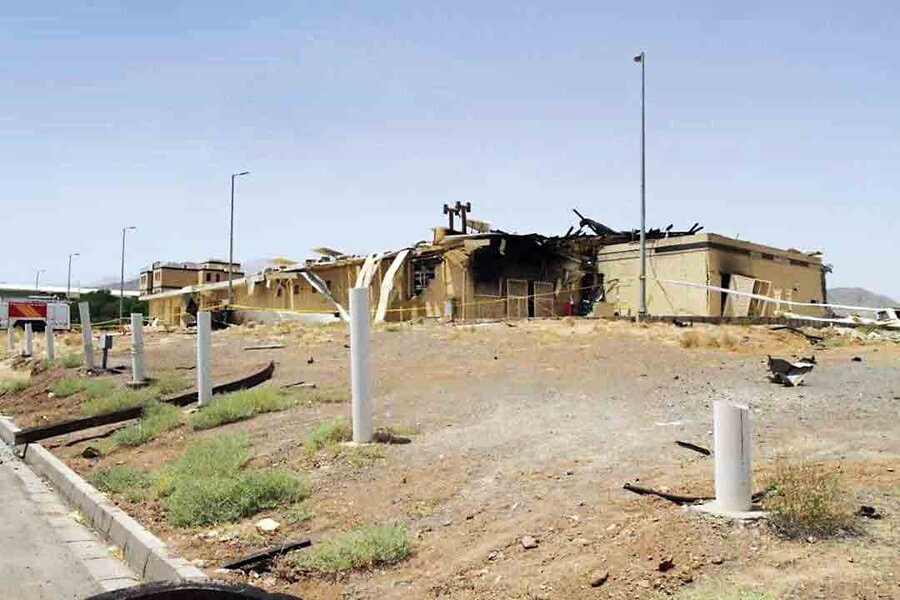TEHRAN - In a bid to address “outstanding questions”, Rafael Mariano Grossi, the director-general of the International Atomic Energy Agency (IAEA), arrived in Tehran late on Monday amid Iran’s growing distrust of the IAEA.
“My objective is that my meetings in Tehran will lead to concrete progress in addressing the outstanding questions that the Agency has related to safeguards in Iran and, in particular, to resolve the issue of access,” Grossi said in a statement before he visited Iran.
The visit came at a time when the IAEA keeps insisting on inspecting two sites mentioned in alleged Iran’s nuclear archive that Israel claims it had stolen from a Tehran warehouse in early 2018. Iran firmly rejected the claim.
The two sites in question – one in the city of Shahreza and the other near capital Tehran- have nothing to do with the Joint Comprehensive Plan of Action (JCPOA), and allegedly included nuclear activities in the past two decades.
Iran has rejected the IAEA request for access to the sites, saying the IAEA request has its root in the Israeli documents which Iran questions their authenticity.
Analysts put the IAEA-Iran cooperation issues in the broader context of the growing lack of trust between the two sides over a variety of issues ranging from U.S. political influence on the IAEA to the UN nuclear watchdog’s unprofessional behavior in conducting inspections in Iran.
“The IAEA’s request to inspect the Iranian sites based on unfounded documents of a regime known for its fabrication would only deepen the mistrust between Iran and the IAEA,” Ali Samadzadeh, the director of International and Security Studies at the Ababil Center, told the Tehran Times.
Samadzadeh pointed to a range of issues that fuelled the distrust of the IAEA in Iran, saying the IAEA has embarked on a “political project” that plays into the hands of the Americans and exacerbates the so-called U.S. “maximum pressure” campaign against Iran.
“I think the trust between Iran and the IAEA is at its lowest level in the history of cooperation between the two sides. Before and after the signing of the JCPOA, many things happened that undermined the trust between Iran and the IAEA. Before the signing of the JCPOA, confidential information related to Iran has been leaked to non-parties to the JCPOA on many occasions, which met with Iran’s opposition. Iran called on the IAEA to protect the confidentiality of the information. After the JCPOA, also many serious things happened. One outstanding case was the expulsion of an IAEA inspector who tried to contaminate the Iranian nuclear facilities with nuclear materials of an unknown origin. The inspector, who was Mongolian, was deported from Iran,” Samadzadeh said.
He added, “Another case was the explosion that occurred at the Natanz nuclear facility, and now, we know that it was an act of sabotage. The only official party that was in the know about the details of the activities at Natanz was the Agency. This created a very deep mistrust between Iran and the Agency. Because the Agency was involved in two destructive projects: the contamination and the explosion.”
According to the expert, the IAEA also failed to strongly condemn the Stuxnet attack on the Natanz facility as well as the recent sabotage at the facility, which further deepened the mistrust.
‘New sheriff in town’
Tensions between Iran and the IAEA have been on the rise since Grossi took over as the IAEA director-general in December 2019, shortly after the passing of Yukiya Amano. Soon after, the new director issued a rebuke to Iran for failing to provide access to the two sites.
In early March 2020, the IAEA, which is tasked with policing the JCPOA, issued a quarterly report on Iran’s nuclear program. Simultaneously, the IAEA issued a separate report calling Iran out for its failure to provide access to the sites, a move that was seen as IAEA’s new policy towards Iran, because it marked the first time since the signing of the JCPOA that the IAEA criticized Iran.
“The general message is: There’s a new sheriff in town,” a diplomat from a country on the IAEA’s 35-nation Board of Governors told Reuters on March 3, referring to Rafael Grossi, who was elected in October with the support of countries including the United States and Brazil.
In an interview with the Japanese television network, NHK, which was later removed, Grossi took a hard line on Iran. The NHK also quoted experts as saying that Grossi’s stance on Iran is similar to that of the U.S.
Grossi himself announced in September 2019 that he will be tough on Iran.
“My approach with Iran will be very firm but very fair,” he told the AFP.
Samadzadeh believes that the IAEA’s track record in dealing with Iran under the leadership of Grossi is indicative of the U.S. influence on the IAEA.
“The Americans usually exploit international institutions to implement their policies against certain countries when they fail to directly pressure those countries. With respect to the Agency, the Americans made efforts to turn it into a part of their pressure campaign against Iran. Under Grossi, the Agency attached credibility to bogus documents presented by hostile regimes. The efforts to abuse the Agency against Iran entered a new stage after Grossi took office. The Agency is being exploited within the U.S. maximum pressure campaign against Iran,” Samadzadeh said.
However, Iran has expressed readiness to further cooperate with the IAEA in a bid to reach an understanding on the unresolved issues. Iran also announced that it had full cooperation with the IAEA. On Monday, Saeed Khatibzadeh, the spokesman for the Iranian Foreign Ministry, said that most IAEA inspections in the history of the body have been conducted in Iran.
Yet, the IAEA failed to build trust in relations with Iran, which raises the question that why Iran should trust the IAEA while it makes no efforts to take Iran’s concerns into account and rebuild the broken trust between the two sides.


No comments:
Post a Comment